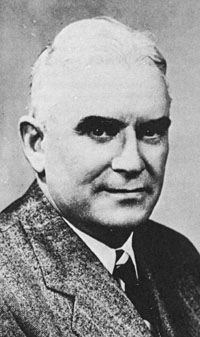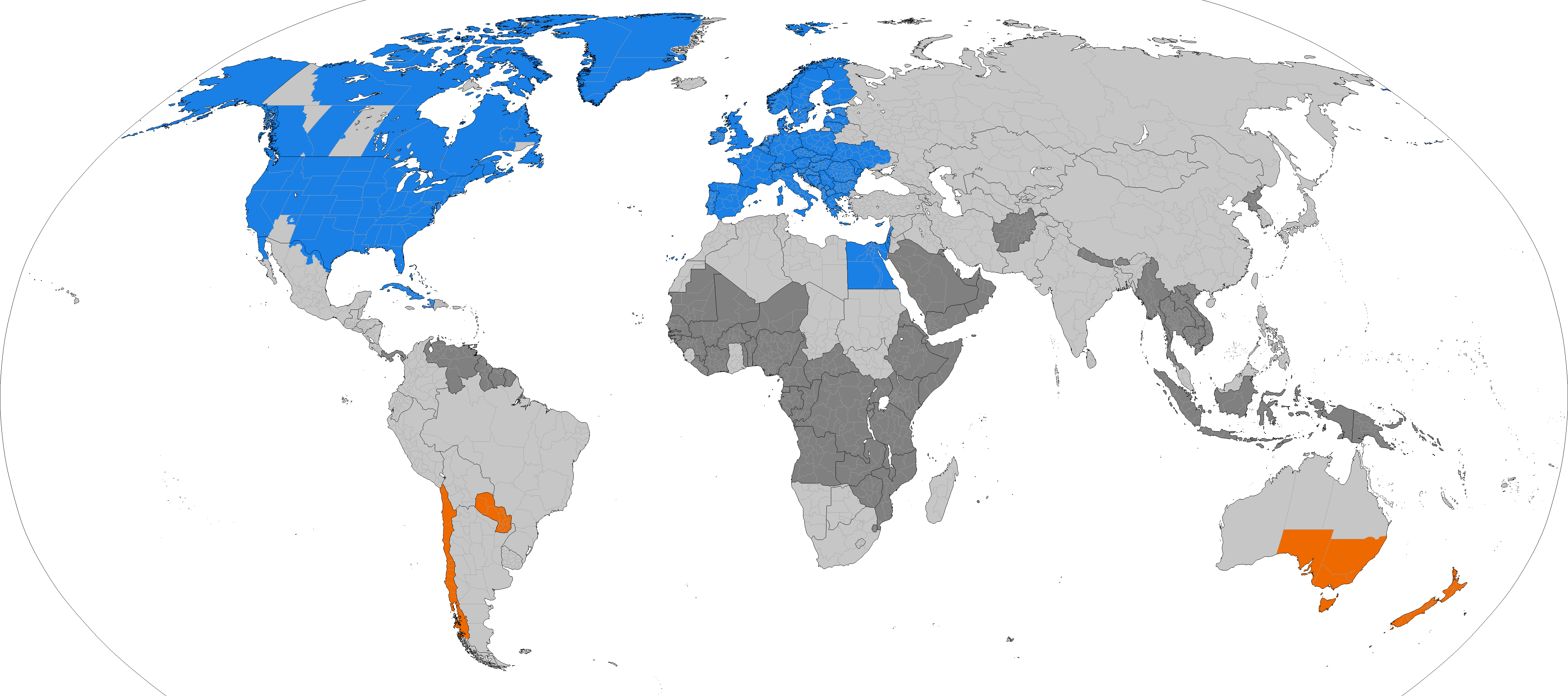|
1952 British Columbia Plebiscite
A two-part plebiscite was held in British Columbia on 12 June 1952, alongside provincial elections. Voters were asked whether they approved of continuing with daylight saving time and allowing liquor and wine to be sold in licensed premises. Both proposals were approved. Background Daylight saving time had been introduced in British Columbia on 6 July 1941. Despite opposition from farmers, the federal government subsequently implemented daylight saving across the country until World War II ended. At the end of the conflict, the provincial government decided to retain the system.Boyer, p127 However, amidst continuing opposition from farmers, in March 1952, they opted to put the matter to a public vote. A 1916 referendum had seen a vote in favour of introducing prohibition in British Columbia, whilst a second referendum in 1920 resulted in prohibition being rejected in favour of a government-administered board becoming responsible for overseeing the retail sale of liquor in gov ... [...More Info...] [...Related Items...] OR: [Wikipedia] [Google] [Baidu] |
British Columbia
British Columbia (commonly abbreviated as BC) is the westernmost province of Canada, situated between the Pacific Ocean and the Rocky Mountains. It has a diverse geography, with rugged landscapes that include rocky coastlines, sandy beaches, forests, lakes, mountains, inland deserts and grassy plains, and borders the province of Alberta to the east and the Yukon and Northwest Territories to the north. With an estimated population of 5.3million as of 2022, it is Canada's third-most populous province. The capital of British Columbia is Victoria and its largest city is Vancouver. Vancouver is the third-largest metropolitan area in Canada; the 2021 census recorded 2.6million people in Metro Vancouver. The first known human inhabitants of the area settled in British Columbia at least 10,000 years ago. Such groups include the Coast Salish, Tsilhqotʼin, and Haida peoples, among many others. One of the earliest British settlements in the area was Fort Victoria, established ... [...More Info...] [...Related Items...] OR: [Wikipedia] [Google] [Baidu] |
1952 British Columbia General Election
The 1952 British Columbia general election was the 23rd general election in the Canadian province of British Columbia. It was held to elect members of the Legislative Assembly of British Columbia, alongside a plebiscite on daylight saving time and liquor. The election was called on April 10, 1952, and held on June 12, 1952. The new legislature met for the first time on February 3, 1953. It was the first BC general election to use a preferential ballot, a short-lived phenomenon in the province. The presence of multi-member districts, such as Victoria City with 3 MLAs, in conjunction with the alternative voting system called for an innovation where the district's candidates were split into three "ballots", each with one candidate from each party. Due to the preferential ballot, the election resulted in a surprise victory for the new Social Credit Party. Not even the Socreds had expected to win the election; the party had no official leader, and was nominally lead through the ele ... [...More Info...] [...Related Items...] OR: [Wikipedia] [Google] [Baidu] |
Daylight Saving Time
Daylight saving time (DST), also referred to as daylight savings time or simply daylight time (United States, Canada, and Australia), and summer time (United Kingdom, European Union, and others), is the practice of advancing clocks (typically by one hour) during warmer months so that darkness falls at a later clock time. The typical implementation of DST is to set clocks forward by one hour in the spring ("spring forward"), and to set clocks back by one hour in the fall ("fall back") to return to standard time. As a result, there is one 23-hour day in early spring and one 25-hour day in the middle of autumn. The idea of aligning waking hours to daylight hours to conserve candles was first proposed in 1784 by U.S. polymath Benjamin Franklin. In a satirical letter to the editor of ''The Journal of Paris'', Franklin suggested that waking up earlier in the summer would economize on candle usage; and calculated considerable savings. In 1895, New Zealand entomologist and astronome ... [...More Info...] [...Related Items...] OR: [Wikipedia] [Google] [Baidu] |
World War II
World War II or the Second World War, often abbreviated as WWII or WW2, was a world war that lasted from 1939 to 1945. It involved the vast majority of the world's countries—including all of the great powers—forming two opposing military alliances: the Allies and the Axis powers. World War II was a total war that directly involved more than 100 million personnel from more than 30 countries. The major participants in the war threw their entire economic, industrial, and scientific capabilities behind the war effort, blurring the distinction between civilian and military resources. Aircraft played a major role in the conflict, enabling the strategic bombing of population centres and deploying the only two nuclear weapons ever used in war. World War II was by far the deadliest conflict in human history; it resulted in 70 to 85 million fatalities, mostly among civilians. Tens of millions died due to genocides (including the Holocaust), starvation, ma ... [...More Info...] [...Related Items...] OR: [Wikipedia] [Google] [Baidu] |
1916 British Columbia Referendum
Two referendums were held in British Columbia on September 14, 1916, alongside general elections. In them, the voters approved Acts of the British Columbia Legislature that introduced prohibition and women's suffrage on the same basis as men. Background The issues of prohibition and women's suffrage dominated much of the final session of the Legislative Assembly before the election. A Prohibition bill with a referendum clause was promised in the Speech from the Throne A speech from the throne, or throne speech, is an event in certain monarchies in which the reigning sovereign, or a representative thereof, reads a prepared speech to members of the nation's legislature when a session is opened, outlining th ... in March, which was supported by Liberal leader Harlan Brewster in a speech to a prohibition delegation in February. The bill received royal assent on May 31, and was scheduled to come into force on July 1, 1917, upon approval by the voters. In the campaign, ... [...More Info...] [...Related Items...] OR: [Wikipedia] [Google] [Baidu] |
Prohibition
Prohibition is the act or practice of forbidding something by law; more particularly the term refers to the banning of the manufacture, storage (whether in barrels or in bottles), transportation, sale, possession, and consumption of alcoholic beverages. The word is also used to refer to a period of time during which such bans are enforced. History Some kind of limitation on the trade in alcohol can be seen in the Code of Hammurabi (c. 1772 BCE) specifically banning the selling of beer for money. It could only be bartered for barley: "If a beer seller do not receive barley as the price for beer, but if she receive money or make the beer a measure smaller than the barley measure received, they shall throw her into the water." In the early twentieth century, much of the impetus for the prohibition movement in the Nordic countries and North America came from moralistic convictions of pietistic Protestants. Prohibition movements in the West coincided with the advent of women's su ... [...More Info...] [...Related Items...] OR: [Wikipedia] [Google] [Baidu] |
1920 British Columbia Temperance Plebiscite
Nineteen or 19 may refer to: * 19 (number), the natural number following 18 and preceding 20 * one of the years 19 BC, AD 19, 1919, 2019 Films * ''19'' (film), a 2001 Japanese film * ''Nineteen'' (film), a 1987 science fiction film Music * 19 (band), a Japanese pop music duo Albums * ''19'' (Adele album), 2008 * ''19'', a 2003 album by Alsou * ''19'', a 2006 album by Evan Yo * ''19'', a 2018 album by MHD * ''19'', one half of the double album '' 63/19'' by Kool A.D. * '' Number Nineteen'', a 1971 album by American jazz pianist Mal Waldron * ''XIX'' (EP), a 2019 EP by 1the9 Songs * "19" (song), a 1985 song by British musician Paul Hardcastle. * "Nineteen", a song by Bad4Good from the 1992 album ''Refugee A refugee, conventionally speaking, is a displaced person who has crossed national borders and who cannot or is unwilling to return home due to well-founded fear of persecution. [...More Info...] [...Related Items...] OR: [Wikipedia] [Google] [Baidu] |




